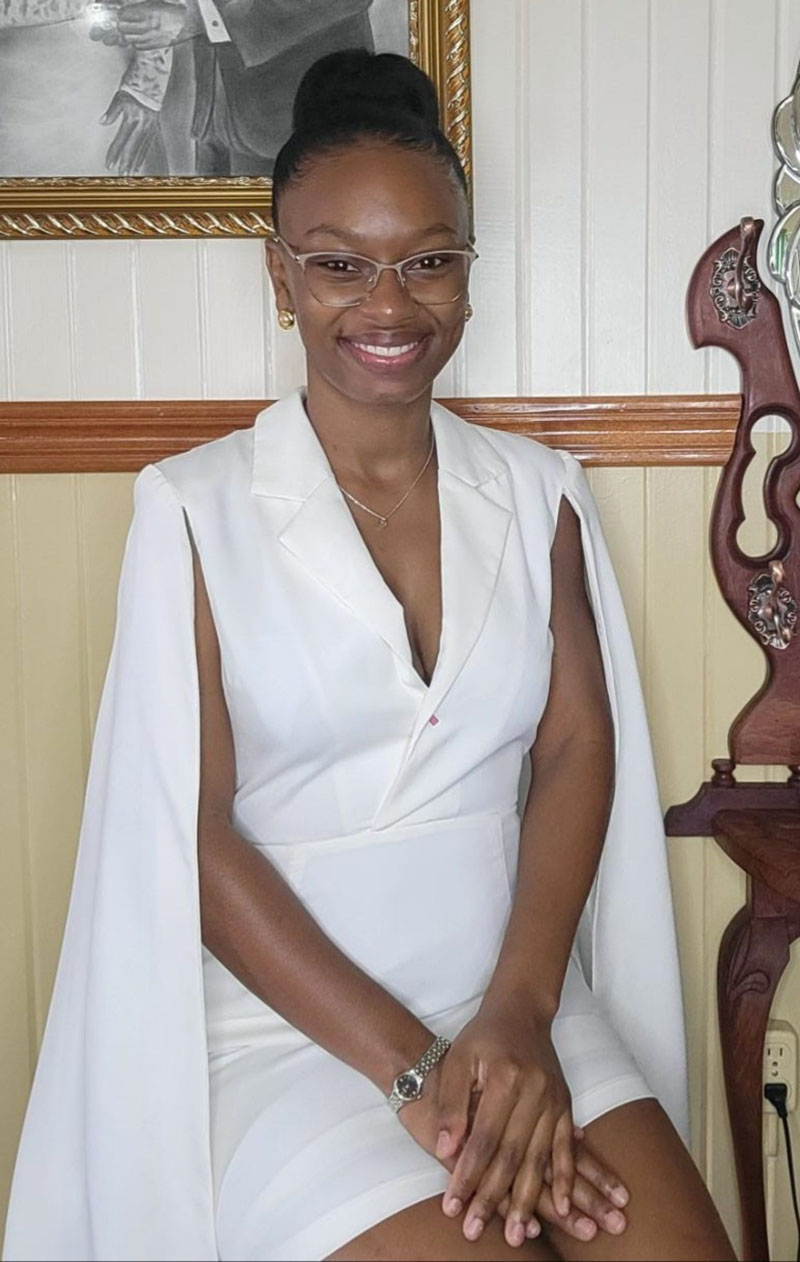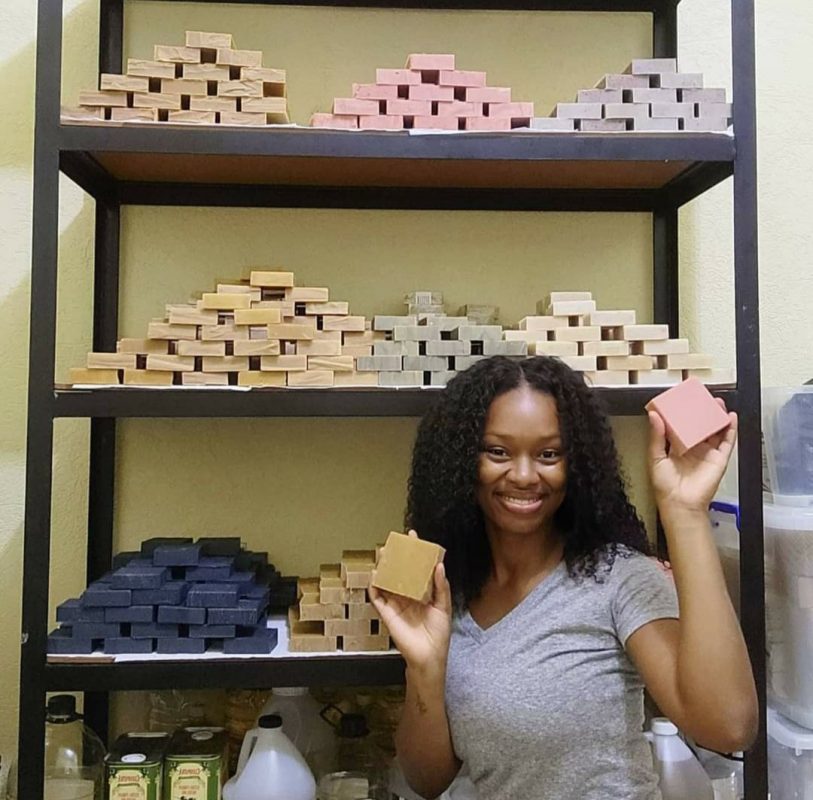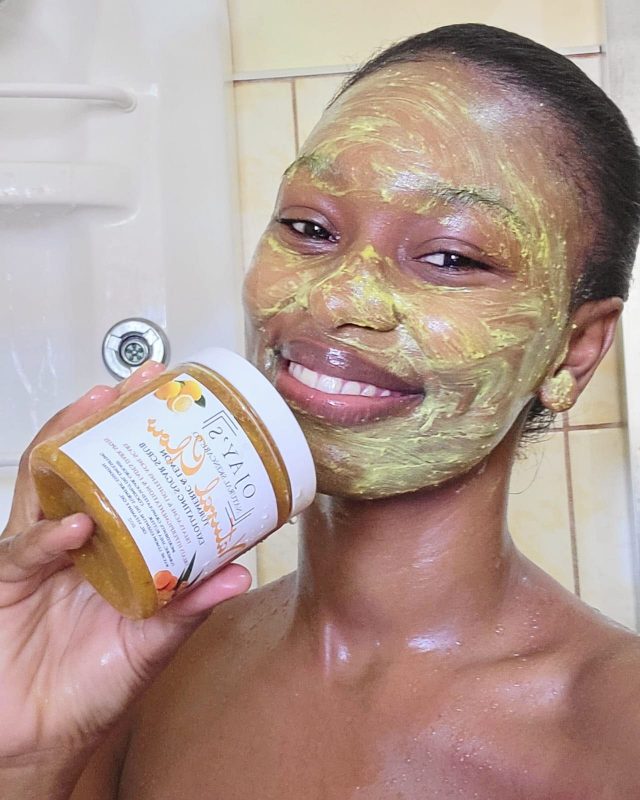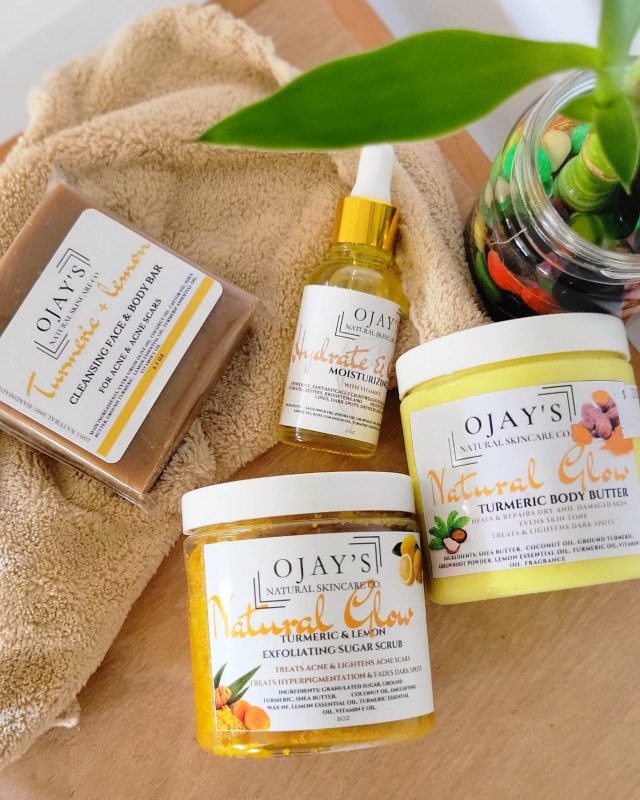As the world was still trying to come to grips with the COVID-19 pandemic last year, Odela Joseph unexpectedly launched a skincare business.
Joseph’s Ojay’s Natural Skincare had its unlikely start in her own search to find a natural cure for her acne, while trying to occupy herself after being laid off and expecting. “I am humbled, amazed and grateful that what I began out of the need to find a natural cure for my breakouts of acne and partly boredom, has not only become my source of income but has created direct employment for some other persons,” Joseph, 27, says, a year and a half later after watching the venture blossom into a thriving business.
Joseph, who spent her early childhood in Ituni, had her formal education at Ituni Primary, Mackenzie High School and President’s College (PC) before obtaining a bachelor’s degree in business management at the University of Guyana (UG) in 2017.
Moving from the small community of Ituni to Linden and then to PC, she said, prepared her for the world of work. “In Linden I had my aunt for guidance, at school I had my teachers and weekends I had my mom. At PC we had one house parent for 200 or so girls, so many times I couldn’t go to her. I had to learn to study on my own, how to manage my own money and how to do everything on my own.”
Joseph knew from a young age that not much job opportunities were available in Ituni and that she wanted to do something big. Her products are stepping stones which she wants to expand.
On leaving PC she worked for a year as an insurance agent then as a clerk in a lawyer’s firm.
“I wasn’t prepared for those jobs because I was shy and they wanted me to bring them business, so when I left and I spent about six months at home learning to sew and to make leather bags which I taught myself by looking and practicing from DIY [do it yourself] videos on YouTube. I’d bought a sewing machine with my last salary. I didn’t sew to make money at first but when my friends found out that I could sew, they all wanted me to take in their jeans.” She still has a leather handbag she made and plans on restarting leathercraft production.
In between studies during the August holidays, Joseph worked part time at Qualfon and UG.
After graduating from UG she was assigned a two-month internship with Aurora Gold Mines/Guyana Goldfields (AGM/GG) in the human resources department. During the internship, the company advertised internally for a document controller. She applied and was successful. A switch to health and safety, however, was on the horizon. As document controller, she was part of the health, safety and environment (HSE) department and her duties included taking minutes of meetings, and documenting training records and safety reports.
“I was learning about HSE through their data and although I had a degree in business management I liked HSE because it helped people. Eventually there was an opening and I applied for the job. As the successful candidate, she took a course in health and safety with New Brunswick University, Canada to become a certified health and safety officer. She began as a trainee and after training was placed on probation before being appointed a health and safety officer. She worked with AGM/GG from June 2017 to January 2020.
She was stationed at Camp Aurora in the Cuyuni River. “That company made me grow so much from the introverted person I was, to become assertive and to give guidance in my area of expertise in a camp predominantly occupied by men who were older and more experienced. As a safety officer, I realized I had to interact with everyone. It meant I had to take control of the situation, especially during incident investigations where I had to be on the ground to find out exactly what happened. That basically pulled me out of my shell into the person I am today.”
In January 2020, a few months before the pandemic was declared, Joseph was retrenched as the company was downsizing due to difficult financial times. She was the newest staff and the least experienced.
“Pregnant at the time, I didn’t want to go out and search for another job. I didn’t know what I was going to do and I became bored at home. I had these acne breakouts and I started reading up about what could help.”
She learnt about natural skin care by using natural products such as soaps. This gave her the urge to want to make soaps.
“I told myself I am going to make soap using turmeric as a natural cure even though I knew nothing about making it and that was what I learned to do. I was going to make cold processed soap.”
Three months into her pregnancy, she began using her severance package to buy the stuff she needed to make the soap based on a US$20 course on Udemy on how to make cold process soap. Udemy is an open online course provider aimed at professionals and students,
“Buying all these stuff to make soap, my sister, Olayne cautioned, ‘You are getting a baby. You want to spend all your money on making soaps?’ I told her I can’t sit down for another six months doing nothing and watching TV all day. I would go crazy.”
Disaster
For the first few weeks into over a month, her cold process soap-making was a disaster. In the first instance, the soap that was supposed to be yellow turned out a dark brown.
“It is a process where you have to mix natural oils with sodium hydroxide with the right measurements until it saponifies. Then I made a batch of soap in which I put too much lye and it broke like a block of cement. I tried other batched. One stayed for four weeks, then another for three weeks and yet another for a week without hardening. I tried and I tried and eventually I got it right. All through that I would think about the money I was spending and question myself if it was the right decision. Should I stop now because I was not seeing the results? And one day I made it and it hardened in the moulds in 24 hours. They came out so nicely and I was so proud of myself I gave every one close to me one each.”
The feedback from those who she gave the turmeric soap was relatively good. They said they saw a difference in their skin after a few days and were excited about the results. Joseph also used the soap for acne and saw the results she wanted.
When she started making the soaps, she had two moulds. Each mould made ten soaps. “When I make the soap and give to one person that person would tell another. They recommended that I sell them.” She took that advice.
She told herself that if she could make the soap she could also make the soap scrubs. “Going through the process was just like making the soap. I made a scrub with turmeric. My sister, who was trying out the products, or I should say who was my guinea pig, was so yellow it wasn’t even funny.”
With the eventual success of the scrubs, Joseph turned to making body butter to take care of stretch marks on her belly. “My skin then compared to now is much improved, I can’t thank myself enough.”
She started selling the scrubs which was helping with acne and dark marks, and body butter. She worked from home and could not keep track of orders and sometimes she would have more orders than products in the case of butters and scrubs. “It was hard because by then I was heavily pregnant. I stayed up late at night to make the scrubs. I didn’t want to start with a bad reputation that I couldn’t deliver when I confirmed the order. A friend, Keimo picked up the orders and delivered on his days off from his work. I don’t know what I could have done without him because taxis were very expensive.”
From two small to 12 large
She started with the two moulds that made ten soaps each. Then her partner, Boaz Wade, made her another mould that made 40 soaps at a time. “It really worked well for a time. All I had to do was take a knife and cut them but that was insufficient. He then made a makeshift cutter but the soaps were never even.”
Aftershe delivered her baby in September, she took a two-month break and resumed work on November 20.
She restarted with the old equipment and printing the labels herself as she could not afford to outsource the printing. She tried to waterproof them but that did not work. She then engaged a printer who had previously done signs for GG to print the labels that she designed. “That was an improvement.”
In January 2021, she told herself that if she had to fulfill the demands she had to improve on her products. “Not everyone is going to want a crooked soap. So at the start of the year she bought a professional cutter and a mixer for body butter and scrubs.
Wade made her 12 moulds that made 77 soaps at a time. “I looked at him making the moulds and questioned if I would ever use all the moulds.” While she does not use all twelve at the same time she has been using them all.
“That is how the demand has grown. I used to import 25 jars of raw material at a time now I’m bringing in 750 at one time. I used to store the materials in my bedroom and make the stuff in my kitchen late at night when no one was around. I lived with my brother and sister at the time.”
In my bedroom I had this closet where one side of my closet I had all the materials I needed to make my products. I now have my own workshop downstairs of my home in Tuschen, where I make and store the products.”
Instead of delivering to individuals from home, she rented shelves in three co-op spaces in Georgetown, two in Berbice and one in Linden.
“Customers would buy the products off the shelves so quickly that I could not restock in a timely manner.”
In October this year, she decided to rent a space at Croal and Alexander Streets in Georgetown because it was getting difficult to supply the different locations with the quantities required. “Now I have one place in Georgetown instead of three. It has its advantages and disadvantages because I am gaining customers but depleting customer service.”
In September this year, while Joseph was making the products, delivering the products to the co-op spaces, managing inventory at the co-op spaces, and marketing her product on her social media account, her Instagram page was hacked and she was locked out of it. “I honestly felt like I lost it,” she said.
Ninety 90 per cent of the orders came from that page. She created a new page and started regaining her customers.
With the orders came demands on her time. “It was getting really tiresome. My baby is my priority. Sometimes I couldn’t sleep. I was basically losing grip with what was happening. I knew I needed help.”
To give herself a break, she employed someone to manage the store and sales on a daily basis and employed another to assist in packaging and labelling for delivery to Georgetown.
Asked about her plans going forward, she said, “I am amazed at some of the customers’ reviews about before and after the use of the products. It is a big motivator so I plan to expand on these products. I have three soaps for acne and one for stretch marks.” Joseph is hopeful that her products can help women with their skin because common skin care issues, like, acne, age spots, stretch marks, hyper pigmentation, eczema and dark spots, can make many feel insecure.
While she believes that all the ingredients she uses can be obtained locally, at present she imports about 75 per cent of them because of poor quality or inadequate quantity of the local products. Tumeric, coconut oil and sugar for scrubs are produced and obtained locally. While other imported products could be obtained locally, she said, the importers do not charge retailers prices so she has to import from the foreign sources where it is cheaper. “As a small business I can’t believe how much Ojay’s has grown. I honestly see my retrenchment as a blessing as my former job from which I was retrenched, was becoming stressful.”









